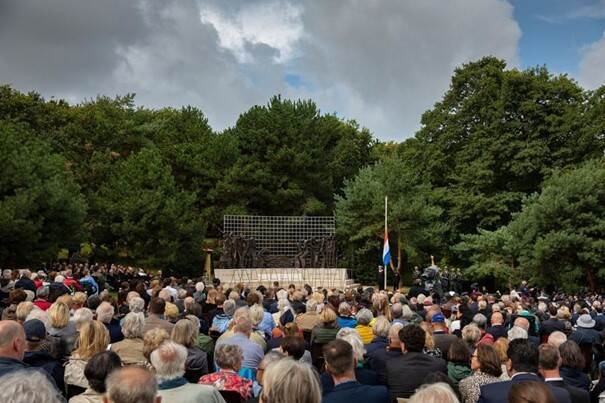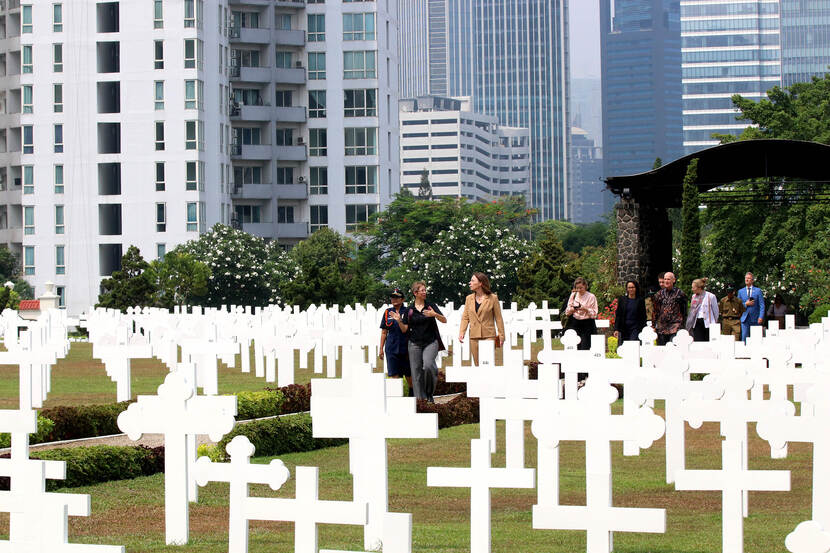Eighty years on: the end of the Second World War
Weblogs
The Second World War left deep scars, not only in Europe, but in Asia too. For the Kingdom of the Netherlands – which at the time included the Dutch East Indies – the war did not end until 15 August 1945. This was the day that Japan surrendered, finally bringing the conflict to an end in Asia. Each year on this date the victims are remembered in the Netherlands and at Dutch representations in many parts of the world.

Japanese occupation and forced labour in the Dutch East Indies
During the Second World War, Japan – an ally of Nazi Germany – invaded and occupied the Dutch East Indies (present-day Indonesia). Europeans and Indo-Europeans were held in prisoner-of-war camps and civilian internment camps. Millions of Indo-European men and thousands of Dutch and Allied men were subjected to forced labour, including building railway lines. Condition were dire, with tropical diseases, malnutrition and hard labour claiming lives every day.
Hundreds of thousands of civilians, including children, were interned in camps; hundreds of thousands more were left to fend for themselves outside the camps. Tens of thousands of ‘comfort women’ were exploited, and hundreds of thousands of people subjected to inhumane forced labour, including many prisoners of war and Indo-European romushas. The war affected all layers of society in the Dutch East-Indies.
War cemeteries in Indonesia
Victims of the Second World War and the Japanese occupation are buried at war cemeteries across Indonesia, including in Jakarta, Bandung, Surabaya, Ambon, Semarang and Cimahi. At these cemeteries, soldiers are laid to rest alongside civilians, men alongside women and children.
Some war cemeteries are of special importance. Kalibanteng War Cemetery in Semarang is known as the women and children’s cemetery. Menteng Pulo War Cemetery in Jakarta houses the Simultaan Church and the columbarium, a structure filled with urns containing the ashes of victims cremated in Japan. Ancol War Cemetery is the final resting place of people executed during the occupation because of their origins or resistance activities.
Remembrance ceremonies in Indonesia
On the 80th anniversary of the end of the war, remembrance ceremonies will take place across Indonesia, at which the Dutch embassy and consulates will be represented. Wreaths will be laid on behalf of the Kingdom of the Netherlands, the Ministry of Defence, the Netherlands War Graves Foundation and the 15 August 1945 Commemoration Foundation.
- Cimahi – Leuwigajah War Cemetery: wreath-laying ceremony attended by the Dutch defence attaché, colonel Norbert Moerkens.
- Bandung – Pandu War Cemetery: wreath-laying ceremony attended by the Dutch defence attaché, colonel Norbert Moerkens.
- Surabaya – Kembang Kuning War Cemetery: gathering led by honorary consul Lily Jessica Tjokrosetio and deputy defence attaché, commander Patrick Stähli.
- Jakarta – Menteng Pulo War Cemetery: speech at the Simultaan Church by ambassador Marc Gerritsen, followed by a wreath-laying ceremony at the Flag Monument.

Remembrance ceremonies in Thailand
Over 2,800 Dutch victims are buried in Thailand and Myanmar. These are prisoners of war who, during the Japanese occupation, worked as forced labourers on the infamous Burma-Siam railway. The deplorable conditions claimed the lives of many men.
The Dutch embassy in Bangkok commemorates these victims each year on 15 August during the official ceremony at Kanchanaburi War Cemetery where over 2,200 of them are buried. The ceremony will also be attended by representatives of Allied countries, the Thai authorities and the local Dutch community. This year, to mark the 80th anniversary, visitors will place white roses on the graves.
After the ceremony, the Dutch ambassador and members of the embassy staff will also pay their respects at Chungkai War Cemetery. For the last two years schools from the area have also been involved, so that the stories and lessons of the war can be passed on to future generations.
Remembrance ceremony in Japan
Each year on 15 August, the Dutch embassy in Japan organises a remembrance ceremony at Yokohama War Cemetery, where many Allied prisoners of war are buried or commemorated, including Dutch nationals who died during the war in Asia. Together with other embassies and local partners, the embassy reflects on the victims and the shared legacy of war.
Lessons from the past
The lessons of the Second World War are still relevant today. The conflicts raging around the world are a reminder that peace and security should never be taken for granted and that international cooperation and solidarity are indispensable.
The pursuit of justice and the protection of international law are essential aspects of security. That is why it is important that The Hague hosts the International Criminal Court and the International Court of Justice. Like the many war cemeteries, these institutions bear the unspoken promise that injustice must not go unanswered.